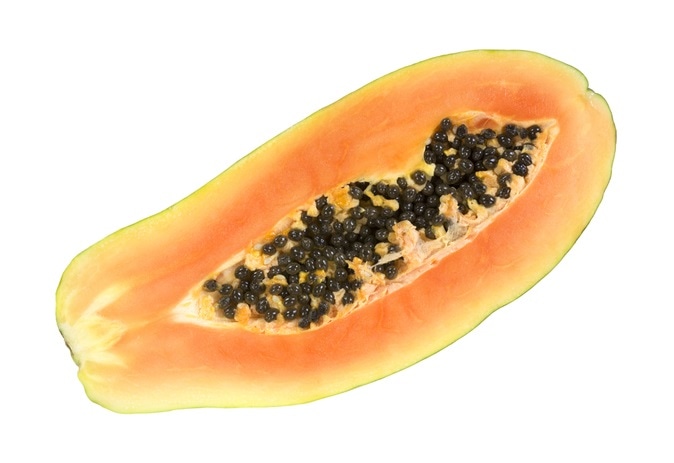A total of 47 people have been infected with Salmonella Kiambu infections from 12 different states as of 21st July 2017, reports the CDC. Of these, 12 have had to be hospitalized and one person from New York City succumbed to the infection. Maradol papayas have been found to be the likely source of this infection and the CDC has recommended people not to consume these until its clear.

Maradol red papaya. Image Credit: BW Folsom / Shutterstock
Symptoms of Salmonella infection usually start within 12 to 72 hours of consuming a contaminated food. There is diarrhea, cramps over the abdomen and fever for around a week. The infection usually resolves by itself. In some however, the diarrhea may be severe requiring hospitalization. The young, old and those with a compromised immunity are at a greater risk of an exaggerated course of symptoms, complications and severe cases of illness.
The CDC health officials are keeping track of the infection using a system called the PulseNet system. The US Food and Drug Administration (FDA) is also investigating the multistate outbreak of Salmonella Kiambu infections. PulseNet is helping officials identify the cases of the infection that is part of the outbreak which has spread across multiple states. PulseNet is a form of nationwide network that includes public health and food regulatory agency laboratories and is looked after as a whole by the CDC. States affected include Iowa, Kentucky, Louisiana, Massachusetts, Minnesota, New Jersey, New York, Pennsylvania, Texas, Utah, Virginia and Maryland.
The laboratories have performed a DNA fingerprinting of the bacteria Salmonella that has been obtained from the ill persons. This uses techniques called the pulsed-field gel electrophoresis (PFGE) and whole genome sequencing (WGS) to look at the genetic make up of the bacteria. This helps in tracking it down and identifies its sources. PulseNet maintains a database of the DNA fingerprints that are collected to provide data about the outbreak. In this Salmonella outbreak for example, all 47 people from the 12 states who have been affected, have been found to harbor genetically similar Salmonella bacteria. WGS has revealed the genetic makeup of the isolated bacteria.
The first cases appeared between May 17th and June 28th this year. Ages affected ranged between less than one year old infants to elderly over 95 years. Median age of the affected thus was 27 years. Case distribution showed 67% of the affected are females. With the available information from 31, 58% are Hispanic in origin and with available information from 33 persons, 12 have been hospitalized (36%).
Detailed investigation into the source of the infection showed that Maradol papayas might be the likely source. All ill persons were interviewed regarding what they ate prior to their infection. 11 of 25 persons asked or 44% reported having these papayas. Quite a few individuals from Maryland were detected with the infection. Several of these individuals reported having had the papayas purchased from a local grocery store. The indications point that if a particular store has been the source of infection for several unrelated persons, there is a likely contamination there. Thus the Maryland Department of Health collected the papayas from the said store and investigated in details. Two samples of Maradol papayas showed presence of two different strains of Salmonella - Salmonella Kiambu and Salmonella Thompson. WGS was then performed to check if the Salmonella Kiambu strains were similar to the persons with the infection elsewhere – it matched. Maradol papayas are thus now suspected to be the cause of the infection.
Thus the CDC now recommends the public not to buy or eat Maradol papayas till they have been cleared. They have asked restaurants and eateries to stop serving these papayas and retailers to stop selling them. More information is being sought. Until then, its best to avoid these fruits.
Source: https://www.cdc.gov/salmonella/kiambu-07-17/index.html